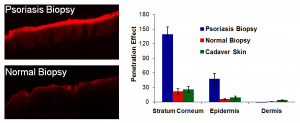Nanospheres as Delivery Vehicles for Psoriasis Therapeutics
Psoriasis, characterized by pink colored plaques and white flakey skin, is a disease where T cells, dendritic cells, macrophages, and keratinocytes give rise to high levels of cytokines (IL-1, IL-2, IL-6, IL-8, IFN-γ, and TNF-a). It involves increased keratinocyte proliferation along with inflammation in the epidermis.
At the New Jersey Center for Biomaterials, a topical psoriasis therapy consisting of tyrosine-derived nanospheres (TyroSpheres) with encapsulated drug has been developed. These TyroSpheres are composed of copolymers with hydrophobic blocks of oligomers of desaminotyrosyl tyrosine esters and diacids and hydrophilic blocks of poly(ethylene glycol). They effectively encapsulate therapeutically relevant drugs and release them in a rate-controlled manner. TyroSpheres offer potential in the treatment of psoriasis by enabling delivery of difficult to uptake drugs into the epidermis where the disease originates as evidences by the skin distribution studies using a fluorescent dye as a model compound. These studies, highlighted in Figure 1 confirm that: 1) TyroSpheres deliver significantly higher amounts of the payload to psoriatic skin compared to healthy skin and cadaver skin, and 2) TyroSpheres deliver their payload to the basal layer of the epidermis, the target layer for treatment of psoriasis.
TyroSpheres are non-cytotoxic, provide enhancement of drug solubility and stability, controlled release, and allow for drug delivery into the epidermis where psoriasis originates. These factors make our delivery system an excellent candidate for the treatment of skin diseases, like psoriasis, where topical drug delivery with limited systemic exposure is required. This topical system enables the delivery of more potent therapeutics to be explored for treatment.
Funding Source: National Institute of Arthritis and Musculoskeletal and Skin Diseases (R01 AR056079-3)